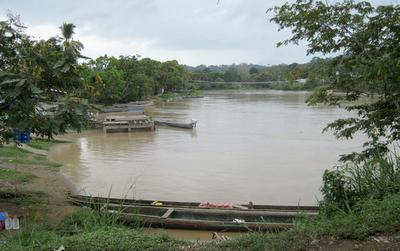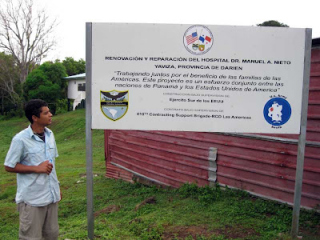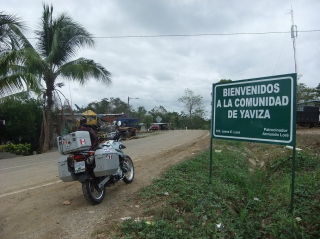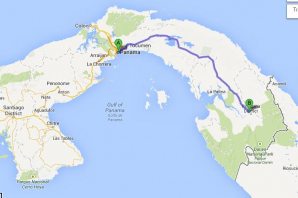Yaviza, Panama
![]()
![]()
![]()
![]()
![]()
![]()
![]() Click on Programs to learn more about their work in this community
Click on Programs to learn more about their work in this community
General Information
| Population* | 2000 |
| Number of homes | 650 |
| Avg # of people per home | ~3 |
| Electricity | Yes |
| Corregimiento | Darien |
| District | Pinogana |
| Corresponding Health Center | Within Community |
| Distance from compounds | 2.5 hours |
| Road conditions | Good |
* Population does not reflect how many patients will be seen on medical
brigades as many people from surrounding communities come seeking
Medical Brigades medical attention.
Expressed Needs and Capacities
The community of Yaviza is a rural, Latino community at the end of the Pan-American Highway. It is the farthest community from Panama City that is accessible by road. Agriculture, the lumber industry, and cattle farming are the primary sources of income for the distant community. Yaviza is a cross-section of the many different cultures and populations of Panama, including Latino, indigenous, and afro-carribean. The community has expressed motivation to collaborate with Global Brigades. The main self-identified needs are combating social and addiction issues within the community, as well as social services, namely water and electricity.
Yaviza has three schools: a primary school for children until the age of 9 years, a secondary school, and a night school. Between the primary and secondary schools, there are approximately 900 students. It is staffed by 62 teachers. Between the two schools, there are only 20 classrooms.
The community of Yaviza has a water system piped through 95% of the community. This chlorinated aqueduct-turbine system runs everyday, however, the water pressure is relatively poor, and as you get to the extremeties of the community the aqueduct system often has issues reliably delivering water. Only 1% of the community filters their water in their homes. Yaviza does not currently have a water committee.

Yaviza has its own hospital. The United States military has invested financial resources into its development and has also brought in medical professionals to train local medical staff. Additionally, the community has a health committee to monitor concerns in the community. The most common illnesses in the community are gastrointestinal parasitic infections, respiratory diseases, skin diseases, and chronic conditions such as hypertension. Their hospital also offers dental services.
Approximately 90% of the community has hygenic latrines, and approximately 95% have cement floors, which improves the overall hygenics within the home. Yaviza does posess a health committee.

For the men in the community, the main forms of employment are agriculture and raising livestock, along with a small portion that work in wood extraction. The women mainly take care of the home. The community also has a portion dedicated to tourism. People raise chickens for their own personal consumption, as well as pigs which they also sell. Crops produced include corn, plantains, a root vegetable called ñame, and zapote. Local businesses in the area consist of kiosks, small stores, hostels, as well as a few people that sell food from their trucks.
Although there is a Western Union and a savings bank within the community, many community members feel that it is difficult to access credit.
Within the schools of the community and the nearby University of Panama, the government organization ANAM (Autoridad Nacional de Ambiente/National Authority of the Environment) offers environmental education. Within this education includes workshops on how to recycle to combat the fact that there are very few places and ways to recycle within Yaviza.
The main method of waste management is the bringing of trash to a nearby dump. There is no current Environmental Committee within Yaviza. There does exist local reforestation projects through the church, which plants native species around the community.
Community members of Yaviza have access to legal support through a government services building located within the community. However, there is no lawyer that currently works in the community to assist them with their various issues. The most common legal issues within the community include: issues of alimony and childcare, land issues, domestic violence, and some violent crimes.
Yavizy has a city-wide deputy, Salvador Real Chen, as well as a government representative Jaime Enrique Loren.
Yaviza has many other organizations that work alongside different parts of the community. From the community itself comes a cultural dance group, a parent's organization through the school, a church group, sports group, as well as assistance from government organizations such as a women's group through INADEH (Insituto Nacional de Formación Profesional y Capacitación para el Desarrollo Humanitario/National Institute of Professional Training for Humanitarian Development), IPACOOP (assists with community savings and loan cooperatives), INAAN (El Instituto de Acueductos y Alcantarillados Nacionales/National Institute of Acqueducts and Sewers). There are also a few NGO's that work within Yaviza: RET, who provides education to undocumented migrants; USAIT, who work with sports; and APRODISO, which supports local businesses, such as tourism organizations, women's groups, and scholarships.
Both Medical/Dental Brigades and Human Rights Brigades are working in Yaviza. The community leaders are very excited about the opportunity to continue to work with Global Brigades volunteers!

Source of information: Key informant interview
Date of interview: Summer 2013
